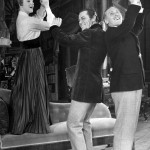Posted my thoughts on the California ruling a little while ago at Inside Catholic – my concern is for the welfare of the churches, and by churches I don’t mean only Catholic churches but all religious affiliations that could possibly find themselves hounded by the government and lawyers on this issue.
…once again – as with Roe v Wade, an activist court (not the legislative body) has overturned what was essentially “the will of the people.” That never serves us well. And depending on who gets into the White House, we may see perhaps as many as three SCOTUS justices replaced by judges of an activist bent.
[…] I frankly think it might be a better thing if the religious sacrament of marriage were separated from the legal action of marriage, and vice versa. Perhaps it would be wise for us to adopt the practice of France, where the civil marriage takes place at City Hall, and the Sacramental marriage at the church.
A civil union is a mere legality. It can be defined any way the state wishes, but it leaves the church out of the question of who may “legally” be married and protects her ability to bestow sacraments and practice the faith free from “discrimination” lawsuits and the inevitable punitive damages that can materially destroy her.
Depending on how the courts go, we could conceivably see this issue coming up in a lot of states, and then there will be a press for federal recognition of gay marriage. If the church does not take steps to protect herself now, by advocating this sort of separation of duties and intents, she will be spending a lot of time and money (and losing tax-free status, of course) fighting for the right to practice the faith without government interference.
Bottom line: the churches manage to perform funeral rites without signing the death certificates; they should consider performing the marriage rites without signing the licenses, and distancing themselves from co-operative functions with the government which may open them up to lawsuits originating from and arguing a strictly secularist position.
I actually wrote something touching on this possibility last summer.
I have no problem with civil unions (my line gets drawn whenever someone implies that a church must go against its own theology and sacramental understanding of marriage), so I can understand where Don Surber is coming from in his post, and I agree with him about the “zero-tolerance strain” of liberalism that too often shuts down an exchange of ideas…
Seems to me that in the name of “tolerance,” – since everything is about the T word – the churches are due their fair of “tolerance” too, in the name of right to the free practice of religion.
While we debate that…some folks better think long and hard about how they’ll feel if the next president gets to name 3 new SCOTUS judges – for life. Patterico also expresses some displeasure at the judicial activism superseding the will of the people.
UPDATE: My L’il Bro Thom, holding the same opinion as Patterico, was challenged by his boss, who said, “sometimes the people get it wrong!” To which Thom replied, “but this is a Republic. It’s not up to the courts to make that decision. Remember how you hated it when you thought the SCOTUS overturned ‘the will of the people’ after the 2000 election?”
And please, don’t email me about the SCOTUS thing; I KNOW the decision to overturn the FL court was 7-2, I know the SCOTUS did not “seat” Bush and I know that Gore initiated the court action. But Thom’s point was a good one, too: If you didn’t like what you THOUGHT was “judicial activism” in that case, you should not like what is TRUE activism in this one.
Ed Morrissey at Hot Air has (very typically) the best commentary on this subject I’ve yet read:
Government recognition of marriage is a policy decision that should remain in the purview of the people. After all, no one argues that relationships require government sanction; two people can cohabitate without permission, as long as they’re consenting, unrelated adults. They can form contractual partnerships just like any two adults can, as long as the purposes remain legal. The argument in this case is for government sanction of the relationship as marriage — and as such is a public policy decision.
Had the people of California chosen to recognize gay marriage through legislation, I’d accept it — and in truth, I’d consider that a more rational policy than civil unions, which basically reproduce marriage with a different label. Government stopped being in the sacrament business at the moment it offered no-fault divorces. A civil-union contract has more binding power than does marriage these days. States would do best to leave the term “marriage” as an exclusive province of the churches and have all couples sign civil-union contracts instead, and let the individuals determine whether they feel “married” or not.
Pursuing Holiness also has a very interesting take on a separate angle: Why not let gays have marriage? We’re not using it. More thoughts on that by Maureen Martin (satire).
Related: A friend points out that in Iran, the government interferes with the free practice of religion. We don’t like that about Iran, so we should probably not allow that to happen here.
For those of you calling me an alarmist, Bainbridge gives food for thought.
More coverage:
Volokh has thoughts on the “slippery slope”
Sr. Toldjah
B. Daniel Blatt at Pajamas Media – I’m surprised there is no round-up.
Glenn wonders, did CA just hand the state to McCain?. I doubt it.
Allahpundit looks at the decision.
STACLU
True North
National Review Online has a lot.











